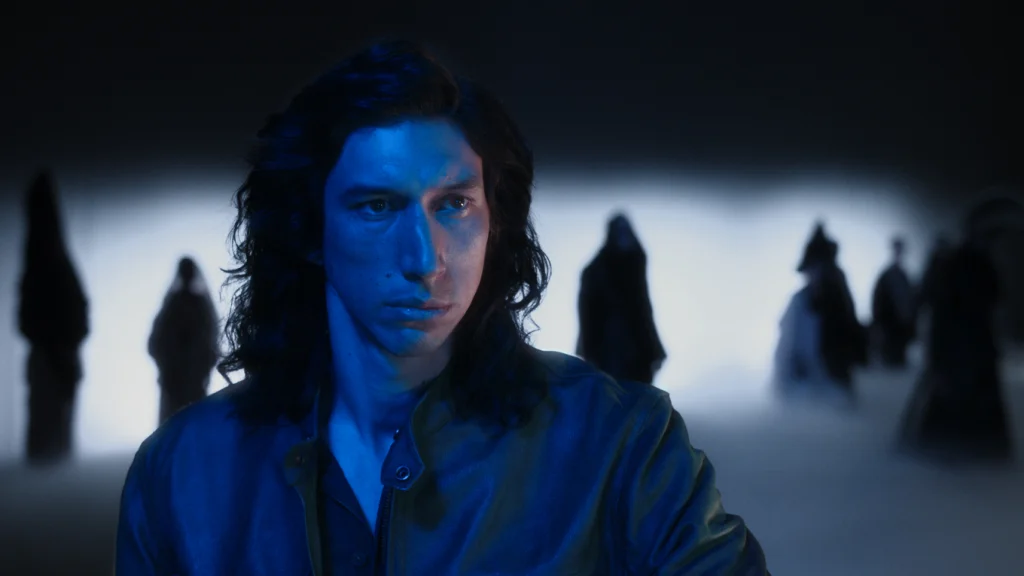
| USA-France, 2021 | Musical/Postmodern | Author Work | Trailer |
Annette is oddly-named frenchman Leos Carax’s latest work, ever since Holy Motors was rehearsed 9 years ago. When I was asked by my usual group of friends and readers for my top movies of all time, the latter was among the best 10 for me, even if it was the only Carax’s work I ever watched. So, given the deep impression Holy Motors carved in me due to its charming but baffling weirdness and excentricity, and also my sparse experience with this director, I felt a mixture between moral obligation, educational curiosity and pure hype to go see Annette at its rehearsal.
It also helped knowing that this movie was a musical. An odd, post-modern and baffling musical? How couldn’t I go see it -even if I am usually cautious with non-classic musicals-? And starring Adam Driver and Simon Helberg?
So, there you got me, a mesh of contradictory feelings covered with raw hype, breaking my beach streak during my summer holidays, just to be prepared to witness the spawn of Carax’s wicked mind and get –hopefully– mindfucked like my cinematographical kinks dictate me.
So, while Annette was not weird for the sake of weird as I enjoy my shit, neither blew my mind nor made me question my sanitity/perception, it became one of these experiences that you enjoy more remembering and elaborating on after rather than during the proper watch. Which is really alright with me. What I did get was what was expectable, a musical coaxed into postmodernity. It had all the conventionalisms of musicals, as any fan would expect, but tarnished with a weird conception of staging that plays with the concepts of meta, farce and opera. To be said, the most similar movie to Annette I can remember watching is Being John Malkovich, in way more depth that may seem at first.
That does not mean that the movie is ununderstandable. In fact, it has a very simple plot and there are no allegories or twisted metaphores of any kind. Adam Driver plays as a provocative stand-up comedy star that marries Marion Cottillard, playing an angel-voiced soprano singer in the pinnacle of her art. Both, incidentally representing the destructive and the preservative forces of nature each, conceive in an unlikely love the McGuffin of this movie, baby Annette. However, there can be no balance between both forces, and the destructive predominates, only to destruct itself later.
As a kind of meta game, the concept of voice -also fundamental in musicals- is predominantly present throughout the movie, as in theme and connotative power in the characters -song lyrics included-. Therefore, the movie is intentionally shot, as a correspondence, in a very artificial, almost theatrical way, that serves both as a continuation of the letimotiv and to exaggerate the farce aspect of the movie, which also includes heavy jabs to hot topics in modern real-life showbiz. This destructive, somber tone is underlined by the musical composition, almost entirely in minor key and barely no existing harmony.
Nevertheless, this does not alter the congenical artistic beauty of Annette. The camera work, colour selection and even organic aspects as bodily connotations of the actors and the obvious wood the puppet that represents baby Annette is made of (powerful image) are pure visual delights.
I read in the net that Leos Carax’s movies give a predominant aspect to music, so it was natural that he would direct a musical sometime in his career. The director himself appears in the opening sequence of the movie, that serves as a direct-to-the-audience prologue where the actors and musicians (Sparks) directly sing to us and warn us about what this movie has prepared for us. That song was my favourite, btw. I also read that Driver acts as the vehicle for Carax’s message to us and also his artistic ideas (as Denis Lavant did in his other movies), which also would explain why his character talks about “looking at the Abyss” and looks directly to the camera at the same time in a certain scene.
I have been writing this text blindly without exactly knowing which were the main points I wanted to highlight. Annette has a lot of things worthy to discuss, that obviously surpass the purpose of my text. I just wanted to elaborate and enumerate some of them, as an appetizer for you my readers to perhaps give it a chance. It’s a mesh of well-thought and planned out postmodernity, where every detail, no matter how weird it may appear, has a purpose and a significance, and there are no knots without tieing. Also, as a post-modern author work, it features all characteristics of the current without being overly baffling or ununderstandable, which I believe it makes it perfect for newcomers to try to understand cinematographic postmodernirty. Terrific.
But, in spite of all, I am adding this sentence some months later. This work did not surpass the test of time.. A flower of one day, perhaps. But these are also beautiful and worthy to enjoy while they bloom before they get forgotten.